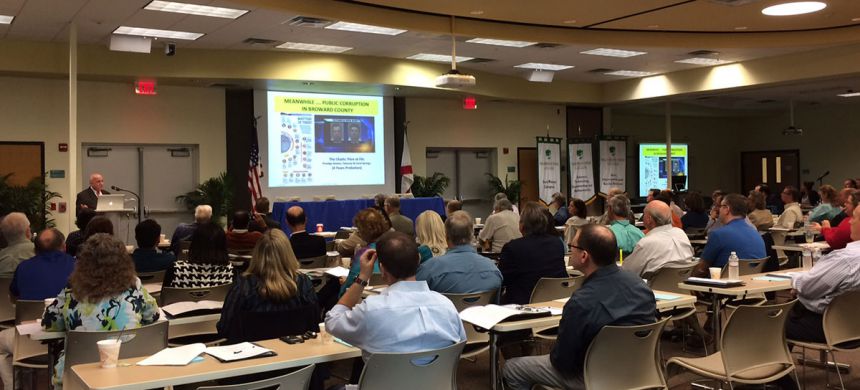History of the Annual Ethics Seminar
Between 2006 and 2008, a steady stream of public officials in Palm Beach, Broward and Miami-Dade Counties were forced to resign, arrested, and in some cases jailed for unethical and illegal behavior. In Palm Beach County, two County Commissioners and two West Palm Beach City Commissioners — three with urban planning backgrounds — pleaded guilty to Federal charges of “Honest Services Fraud” or tax evasion. A prominent land use attorney was charged with aiding a corrupt land development scheme in which a politician concealed his financial interest. Complaints of ethical violations to State regulatory agencies resulted in loss of licenses by the founder of a prominent civil engineering firm. A Grand Jury investigated allegations that elected officials had created a “Pay-to-Play” system in which the allocation of public resources was linked to campaign contributions. Federal investigations were ongoing and more indictments were anticipated.
In Broward County, the Sheriff resigned amid charges of tax evasion and misuse of this office for personal gain. Corruption charges were lodged against members of the County Commission, the School Board and several municipalities. A Statewide Grand Jury empaneled by the Governor lamented that it would recommend abolishment of the Broward County School Board if it were not required by the State Constitution. In the City of Miami, nearly the entire Capital Improvements Department was arrested for running a private civil engineering design business using City equipment and resources. In one national survey, Florida was ranked as the ninth most corrupt state in the nation.
With this background in mind, representatives of the Palm Beach County Planning Congress (PBCPC) and Florida Atlantic University’s Department of Urban and Regional Planning (DURP) met in the Fall of 2007 to organize a seminar exploring the personal and professional ethical challenges this situation raised for land use and planning professionals. The seminar would also identify resources to help individuals recognize and actively resist the “real world” temptations posed by institutional corruption in Southeast Florida.
The planning meetings began with Jaap Vos, DURP Chair; Frank Palen, a private attorney and PBCPC member; and Frank Schnidman, Senior Fellow at the FAU’s Center for Urban and Environmental Solutions (CUES). Joined by an informal Planning Committee that included Susan M. Coughanour, AICP, of the South Florida Water Management District, Kim Glas-Castro, AICP, President–Elect of the American Planning Association Florida Chapter, and Wendy Tuma, ASLA, of Urban Design Studio, Inc., the group spent six weeks organizing the first program, determined to provide an experience focused on what should land use and planning professionals – urban planners, attorneys, landscape architects, civil engineers and others — learn from this “culture of corruption” experience.
Following a brief description of the “culture”, its attractions and pitfalls, the First Seminar explored the laws and rules of professional conduct and identified resources – formal and informal – to help keep participants on the “straight and narrow path.” In subsequent years, our effort was joined by co-sponsors representing the Florida Bar Association, the Florida Institute of Government, the American Association of Landscape Architects and, most recently, the Florida Association of Code Enforcement. The integrity and value of the Program has also been recognized by its designation as a provider of professional education credits for urban planners, lawyers, landscape architects and code enforcement officials.
Since its inauguration in 2007, the Ethics Seminar has been held in Boca Raton during the first week of November. In making this annual effort a true resource, the FAU School of Urban and Regional Planning hosts the web pages that contain the seminars’ archival materials.
From the beginning, the Ethics Seminar has taken an eclectic and inclusive approach to ethical issues, soliciting viewpoints drawn from media, religious, and other institutions that reinforce, interact with or inspire personal, professional and institutional integrity. In 2013, its Seventh Year, after review, the Seminar concluded that substantial progress had been made in statutory and institutional reform in Palm Beach and Broward Counties and a new direction was needed. With the assistance of Dr. Randi Sims of Nova Southeastern University’s H. Wayne Huizenga College of Business and Entrepreneurship, the 2013 Program was re-focused to provide more direct attention to “Maintaining Personal and Professional Integrity in an Ethically Challenged World”. The new direction continued in 2014, with increased consideration paid to helping “Identify and Avoid Ethical Traps.” Last year we addressed “Moral Courage in Action,” building upon our insight that continuing education of land use and planning professionals is one key to replace Southeast Florida’s “culture of corruption” with a ”culture of ethics”. This year, our tenth, we focus on “Looking Forward and Looking Back, examining where we have been and what may lie ahead.
